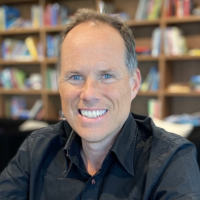"Ultimately, our values come from defining what our goal is as a business and why we are doing it. A conversation about the former without the latter can be quite superficial. If values simply come out of a brainstorming session, they won't be rooted," says James Perry, co-chairman of COOK.
COOK, a producer of frozen ready meals, delivers chef-prepared dishes through nationwide services, 100+ shops, and 1000 stockists. According to Perry, the company’s long-term success hinges on having a clear sense of purpose, which will soon become crucial for ensuring return on investment.
Interdependence over individualism
As Perry explains, companies today face a choice: operate in a vacuum, complying with regulations but nothing more, or take an interdependent worldview.
"We’re at a point where business has to have a role in society beyond delivering shareholder returns. Interdependence must replace individualism to create value for all."
Early in COOK’s journey, Perry faced challenges aligning this mindset with traditional venture capital views focused on maximising profits.
"We needed capital, but we couldn’t take their money because it would have misaligned with our values," he reflects.
Values as a driving force
Perry acknowledges that COOK isn’t perfect, contributing to the unsustainable global food system. However, he believes business can be a force for good.
"Our parents started a bakery that employed recovering heroin addicts, so we were raised to believe a business could have a social mission."
This thinking is embedded in COOK’s DNA, seen in initiatives like their "new talent" program, which hires individuals who have faced incarceration or addiction (currently 3% of their workforce).
Three stages of growth: viability, values, and vision
According to Perry, COOK’s growth can be broken into three stages: first, achieving viability, then formalising values, and finally asking, “How far can we take this?” B-Corp certification provided a framework to embed their purpose-driven ethos, and the company wrote a memorandum formalising its values. Through a company-wide process, 26 attributes were distilled down to five core values.
One value, "Churchill’s Pig," symbolises COOK’s flat management structure, emphasising equality and honesty.
"It’s not about deference; everyone has a voice," Perry says. The company holds regular engagement events to foster candid feedback and keep values alive.
Values in action: enriching lives beyond work
At COOK, one core value is "Be Part of the Family." Training isn’t just about job skills—it’s about enriching employees' lives. Perry recounts how COOK supported an employee’s dream of becoming a dentist. "At a commercial level, that doesn’t make sense, but it showed our people we are living our values."
Companypurpose: nourishing relationships
COOK’s purpose extends to its employees, suppliers, and local communities. Perry emphasises that when values are authentic, employees are more engaged and committed to the company’s success. This deeper connection helped COOK make tough decisions, such as prioritising paying the living wage over issuing dividends.
Customer experience: silent ambassadors of values
COOK’s values influence every aspect of its business, including customer interactions. Perry is cautious about vocalising these values to customers, concerned it could shift motivations and lead to hollow initiatives.
"Customers experience our values, even if we don't trumpet them."
Accountability and the path forward
Perry advocates for transparency and celebration but acknowledges the need for balance. COOK’s journey toward net-zero emissions is science-based, not just aspirational. Perry also suggests businesses need a "court jester" role—someone to challenge the founders' views and ensure integrity.
Values and due diligence
When asked about integrating values into due diligence, Perry highlights that culture and people should be as important as the balance sheet.
"It’s ridiculous just to concentrate on the figures when acquiring a business," he says.
COOK’s journey demonstrates that values are not just ideals—they are essential to thriving in today’s interconnected world.
- Extract from DECISION Magazine report commissioned by CapEQ



